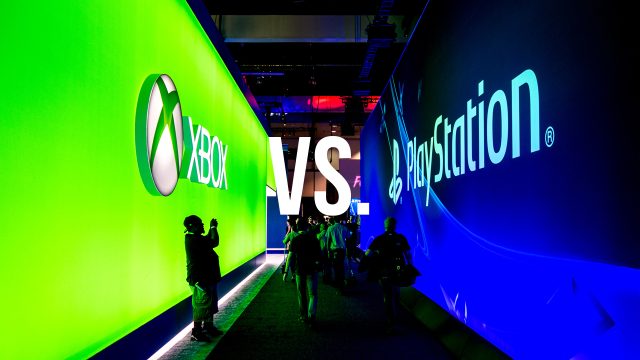
Microsoft stopped providing concrete sales data for its Xbox line years ago, making it hard to get a read on just how well the Xbox One is doing in the market compared to Sony's PlayStation 4. Recent numbers released by analysts this week, though, suggest that Sony continues to dominate this generation of the console wars, with the PS4 now selling twice as many units worldwide as the Xbox One since both systems launched in late 2013.
The first set of numbers comes from a new SuperData report on the Nintendo Switch, which offhandedly mentions an installed base of 26 million Xbox One units and 55 million PS4 units. That report is backed up by Niko Partners analyst Daniel Ahmad, who recently tweeted a chart putting estimated Xbox One sales somewhere near the middle of the 25 million to 30 million range.
Ahmad's chart suggests that Microsoft may have sold slightly more than half of the 53.4 million PS4 units that Sony recently announced it had sold through January 1. Specific numbers aside, though, it's clear Microsoft has done little to close its console sales gap with Sony over the past year—and may have actually lost ground in that time.
The last time we did our own estimate of worldwide console sales, through the end of 2015, we showed the Xbox One with about 57 percent as many systems sold as the PS4 (21.49 million vs. 37.7 million). That lines up broadly with numbers leaked by EA at the time, which suggest the Xbox One had sold about 52.9 percent as well as the PS4 (19 million vs. 35.9 million). One year later, that ratio has dipped to just above or even a bit below 50 percent, according to these reports.Why does it matter?
The relative sales performance of the Xbox One and PS4 doesn't say anything direct about the health or quality of those platforms, of course. Microsoft doesn't seem to be in any danger of abandoning the Xbox One platform any time soon and has, in fact, recently committed to upgrading it via Project Scorpio later this year.
The gap between PS4 and Xbox One sales becomes important only if it becomes so big that publishers start to consider the Xbox One market as a minor afterthought that can be safely ignored for everything but niche games. That's what effectively happened in the early 2000s, when the PS2 dominated the console market to the extent that the original Xbox and Gamecube struggled to attract comparable software support (three years after the PS2's launch, it had sold about four times as many systems as the Xbox, which launched a year later).
There are a few arguments that the current sales gap isn't as bad for Microsoft as it might seem, though. For one, PS4 users that upgraded to a PS4 Pro after previously buying a standard PS4 are effectively double-counted in Sony's numbers, somewhat inflating the total number of potential buyers for PS4 software. For another, the distribution of console owners isn't identical worldwide: Microsoft's absolutely abysmal console sales in Japan suggest that the Xbox One is selling relatively better in the important North American and European markets compared to the PS4.
More importantly, raw console sales don't always line up precisely with the number of "active users" who are continuing to spend money on games and DLC for a console or how much money those users are spending. In fact, there's some evidence from Ubisoft sales reports that Xbox One owners are spending more than their PS4 counterparts on a per-owner basis (though the total PS4 market is still worth much more to Ubisoft overall).
That's essentially the argument incoming Xbox chief Phil Spencer made in late 2015, when he said "we're not motivated by beating Sony, we're motivated by gaining as many customers as we can." On that score, the Xbox One is still selling slightly better than the Xbox 360 did at this point in its lifecycle, suggesting that things are at least moving in the right direction for Microsoft's console division. As Spencer put it in 2015:"[Market] share is important, but more important than share is are we gaining new customers, are they buying games, are they engaged in the service. [Sony and Nintendo] can have success and it doesn't necessarily come at the expense of what Microsoft's main ambitions are."
Since the PS4 and Xbox One are so similar architecturally, porting games from one console to the other is relatively painless from a technical standpoint. For that reason, absent some sort of paid exclusivity deal, most large third-party publishers will probably continue to sell their games on both the PS4 and the Xbox One. The alternative is to simply ignore 26 million potential customers on the Xbox One, which doesn't make much business sense in most cases.
That said, don't be surprised if smaller indie studios (who might not be able to afford costs associated with a port), as well as many Japanese publishers (who don't see the Xbox One as an important domestic sales force), continue to focus many of their titles exclusively on the larger PS4 market in 2017 and beyond. That's the kind of benefit that comes when your console outsells the competition by such a wide margin.
reader comments
116